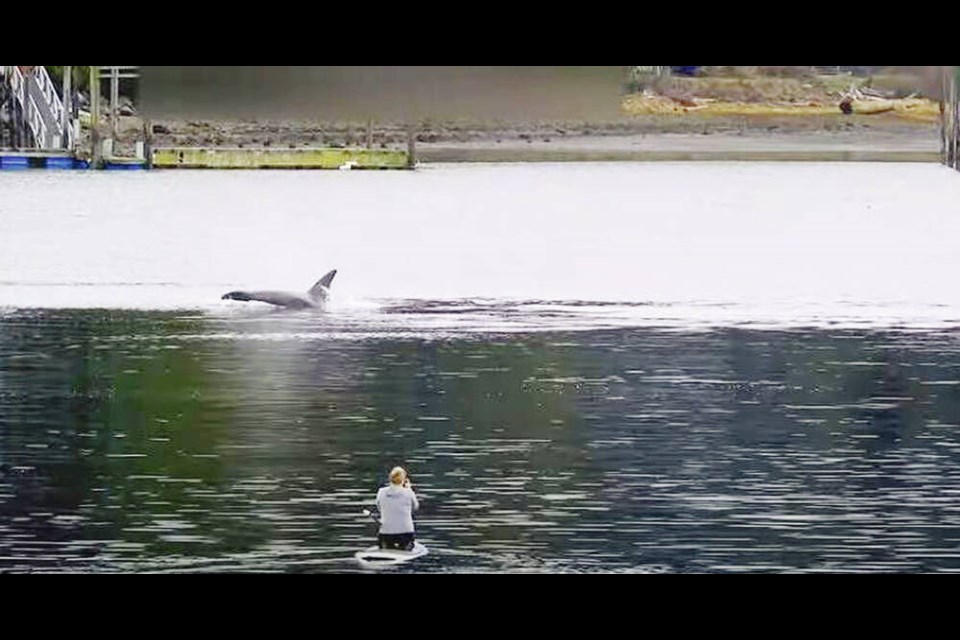A woman has been ordered to pay a $2,500 fine after she was found guilty of paddling too close to orcas in Ucluelet four years ago.
Christie Jamieson, 40, was convicted Tuesday of breaching the federal Fisheries Act after she was filmed paddleboarding near a pod of transient killer whales in Ucluelet Harbour.
The federal regulations require a 200-metre buffer.
Kirsty Walde, chief of emerging programs of enforcement at the Department of Fisheries and Oceans, said she believes the provincial court decision is the first of its kind involving a paddleboarder.
A video and an investigation by DFO, in addition to witness reports, established that Jamieson grabbed her paddleboard and launched it in the water, paddling directly toward the pod on Jan. 19, 2021, well within the 200 metre buffer, said Walde.
The pod, which included two calves, spent a lot of time in the harbour and were highly visible, drawing attention from many who gathered to watch, Walde said, adding that they were likely teaching their young how to hunt for pinnipeds.
Jamieson’s actions were disclosed to DFO’s reporting line, sparking an investigation.
The Fisheries Act is clear that the buffer zone applies to any “conveyance used for transport,” which includes human-powered options, such as kayaks and paddleboards. It also applies to aircraft, and a drone operator and a filming company have been charged under the act, Walde said.
“The rationale behind that is that each of those vehicles has the potential — and we have fairly substantive scientific evidence to prove that there’s potential — for acoustic and physical disturbance by any one of those vehicles when they’re within proximity of marine mammals,” she said.
The buffer provides a safe space for transient killer whales — which are considered a species at risk — to forage, communicate and live their lives, she said.
Walde said the case is a reminder to anyone on the water that they need to know and understand the rules about marine mammal regulations, including the Species At Risk Act. People are not allowed to touch, feed or swim with the animals.
Approaching orcas is not only bad for the animals but potentially “extremely dangerous,” she said.
Walde said she knows the instinct for many when they see whales is to want to get close, but DFO is trying to encourage land-based viewing to give animals their space. She suggested visiting places like Dodd Narrows in Nanaimo, or the Whale Trail in Campbell River, which identifies land-based locations that are great for whale viewing, instead of going out on the water.
“We’re really trying to change that narrative of wanting to get in and get close, and really trying to think about keeping the wildlife wild, giving them their space,” she said.
Walde said Jamieson’s conviction is likely the first of many to come in the next year due to ongoing investigations by fishery officers.
While the Crown in Jamieson’s case sought a $10,000 fine, the judge settled on a $2,500 fine, saying it should serve as a deterrent for others considering approaching whales too closely.
“The lesson for all of us is sometimes we make mistakes. Sometimes those mistakes mean committing an offence,” the judge said in his ruling. “When we commit an offence, there will be penalties.”
Jamieson has three years to pay the fine.
Anyone with information about a violation can call the toll-free violation reporting line at 1-800-465-4336, or email details to [email protected].
>>> To comment on this article, write a letter to the editor: [email protected]



